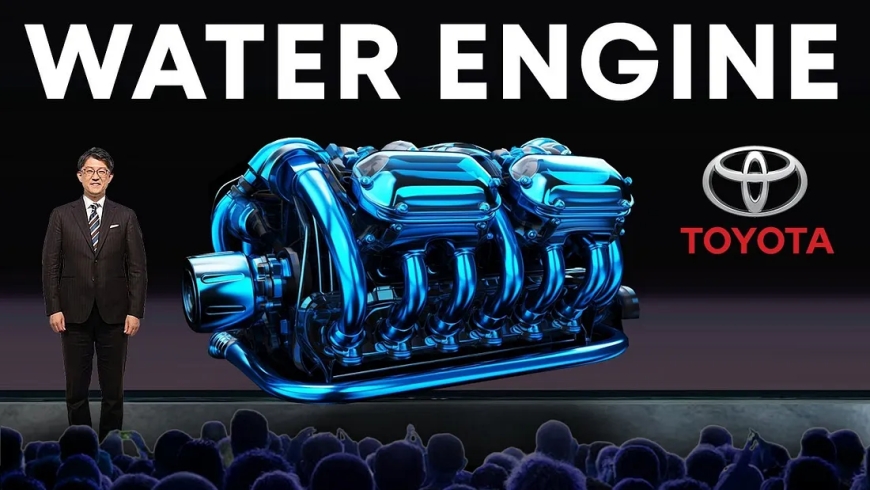Toyota Water Engine Explained: Breakthrough Innovation or Automotive Myth?
But is there any truth to these claims? Is the Toyota Water Engine a genuine breakthrough in green automotive technology, or is it simply an enduring myth rooted in misunderstanding and speculation? In this article, we break down the origins, science, and reality behind this concept—and if you’re passionate about cutting-edge automotive ideas, don’t forget to check our "Write for us Automotive" section at the end.

The concept of a Toyota Water Engine has sparked debate and fascination among automotive enthusiasts, conspiracy theorists, and environmental advocates alike. Imagine a vehicle that runs not on gasoline or electricitybut on water. Over the years, rumors have circulated suggesting that Toyota may have developed such an engine, only for it to be suppressed or hidden.
But is there any truth to these claims? Is the Toyota Water Engine a genuine breakthrough in green automotive technology, or is it simply an enduring myth rooted in misunderstanding and speculation? In this article, we break down the origins, science, and reality behind this conceptand if youre passionate about cutting-edge automotive ideas, dont forget to check our "Write for us Automotive" section at the end.
What Is the Toyota Water Engine?
The term "Toyota Water Engine" generally refers to an alleged prototype or concept vehicle developed by Toyota that supposedly runs on water instead of conventional fuel. According to various sourcesoften lacking verifiable evidencethe engine could separate hydrogen from water and use it to power the car, eliminating the need for gasoline or electric batteries.
Core Concept Behind the Water Engine:
-
Water (H?O) is used as the primary fuel source
-
Hydrogen is extracted via electrolysis
-
The hydrogen powers an internal combustion engine or fuel cell
-
The only emission is water vapor
This concept aligns with broader clean-energy goals, but raises significant questions about efficiency, feasibility, and suppression theories.
The Origins of the Water-Powered Engine Myth
The idea of water-powered cars has existed for decades, long before any mention of the Toyota Water Engine. Several inventorsmost notably Stanley Meyer in the 1990sclaimed to have created engines that could run on water. Meyers work was met with skepticism and eventually legal challenges, further fueling conspiracy theories that energy companies were involved in suppressing such technology.
How Toyota Entered the Picture:
-
Rumors emerged on forums and YouTube videos suggesting Toyota had perfected the water engine
-
Some claimed the technology was shelved due to pressure from oil giants
-
No official patents or public prototypes from Toyota have confirmed these claims
Despite viral stories, Toyota has never officially acknowledged developing a water-powered engine.
Is It Scientifically Possible? The Truth About Water as Fuel
While the idea is appealing, the science behind using water as fuel faces major challenges.
Scientific Reality Check:
-
Water is not a fuel; it's the product of combustion between hydrogen and oxygen
-
To extract hydrogen, electrolysis is needed, which requires more energy than it produces
-
The process is not energy efficient unless powered by renewable sources
-
Storing hydrogen safely in vehicles is still complex and expensive
Therefore, a true water-powered engineespecially one requiring no external energy sourceis not viable with current technology.
What Toyota Is Really Doing with Hydrogen Technology
Although the Toyota Water Engine might be a myth, Toyota is very much involved in clean energy innovationsespecially hydrogen.
Toyota's Real Hydrogen Initiatives:
-
Toyota Mirai: A production hydrogen fuel cell vehicle that emits only water vapor
-
Fuel Cell Technology: Uses stored hydrogen, not extracted water, to generate electricity
-
Investment in Hydrogen Infrastructure: Toyota is actively promoting fuel stations and green hydrogen production
-
Collaborations with other industries to adapt hydrogen for trucks, buses, and industrial equipment
These innovations demonstrate Toyotas leadership in alternative fuelsjust not in the form of an engine that runs directly on water.
Why the Myth Persists: Conspiracy or Miscommunication?
The Toyota Water Engine myth continues for several reasons:
-
Public mistrust in oil and energy corporations
-
Misinterpretations of hydrogen fuel cell technology
-
Viral content and pseudoscientific claims on social media
-
Confusion between electrolysis-based hydrogen and direct water usage
While there's no proof of a suppressed water engine, the allure of a limitless, clean fuel source keeps the conversation alive.
The Future of Green Vehicles: Beyond the Water Engine
The automotive industry is rapidly transitioning toward eco-friendly propulsion methods, but water-powered cars arent part of the realistic roadmapyet.
Viable Green Alternatives Toyota and Others Are Focusing On:
-
Electric Vehicles (EVs) with advanced battery technology
-
Hydrogen Fuel Cell Vehicles (FCVs) like the Mirai
-
Hybrid models combining gas and electric power
-
Synthetic fuels and biofuels for existing combustion engines
In 2025 and beyond, Toyota is expected to continue pushing the boundaries of sustainabilitybut based on science, not science fiction.
Final Thoughts: Myth Meets Reality
The Toyota Water Engine remains more of a mystery than a mechanical reality. While the concept of a car that runs on water is exciting, current science does not support it as a viable or efficient energy source. What is real, however, is Toyotas commitment to clean energy, particularly through hydrogen fuel cell technology.
So, is the Toyota Water Engine a breakthrough innovation or an automotive myth? As of now, it's firmly in the realm of mythbut it continues to inspire curiosity and innovation across the industry.



































